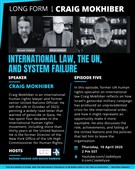Last summer, a University of California (UC) advisory committee published a report claiming that "anti-Israel" speech and student activism creates a hostile environment for Jewish students on campus. Civil liberties organizations and progressive Jewish groups immediately criticized the report for its flawed methodology, and for the threat it posed to academic freedom and free speech. Former UC President Mark Yudof was forced to distance himself from the report`s recommendations. However, the California State Assembly passed a resolution shortly thereafter lauding the report and recommending implementation of its recommendations.
In the below video, Yaman Salahi and Richard Barton participate in a forum hosted by UC Santa Cruz on 23 May 2013 to discuss these developments. Salahi is a member of the National Lawyers Guild working with a coalition focused on student free speech issues, and a former member of Students for Justice in Palestine (SJP). Barton is coauthor of the controversial “Jewish Campus Climate Report” and National Education Chair for the Anti-Defamation League. Moderated by Provost Helen Shapiro, the event also featured introductory remarks from UC Santa Cruz Professor of History Peter Kenez, who spoke about the history of anti-Semitism, and Professor of Feminist Studies Bettina Aptheker, who provided historical background on the idea of academic freedom.
Seeking To Limit the Realm of Acceptable Speech
Barton’s main contention through the debate was that “the Jewish community” views protest activities against Israel as anti-Semitic, and has a close identification with Israel. Salahi challenged Barton’s reliance on the notion of a monolithic Jewish community, and drew attention to SJP’s clear position against anti-Semitism. Salahi further maintained that the dispute is not about what is anti-Semitic, but rather a political dispute about how narrowly criticism of Israel must be framed to fall within the realm of acceptable discourse (specifically, whether one can do more than “oppose the occupation”).
Salahi also argued that it was important not to stick at the high-level framing discussions, but look at what people are specifically complaining about. Salahi quoted a complaint by a Jewish student who filed a lawsuit against the UC, claiming her experience at a mock checkpoint—where students dress as Israeli soldiers and Palestinian civilians to reenact military checkpoints in the Occupied West Bank—were “terrifying and demeaning in extreme degrees” and that “no one before had ever stopped her while carrying an assault rifle and yelling. She was ashamed and terrified for weeks.”
Salahi asked:
If that theatrical performance was so terrifying, then the real thing can only be so much worse … If you are going to object to these theatrical reenactments on campus, you have to object to the real thing in the Occupied West Bank against real people, who are going through real checkpoints, with real soldiers with real guns, that have resulted in real injuries and real deaths.
Defining Anti-Semitism
Barton and Salahi also debated the relevance of “official” definitions of anti-Semitism adopted by the US State Department and a European Union working group. Salahi noted that references to these definitions are fallacious and circular because “the groups who drafted the definitions are now the ones who want to use them against the people they disagree with,” as if they were neutral and authoritative. Barton claimed that the “genesis” of the definitions was based "the European Union and others looking at the notion of anti-Semitism within Europe, with respect to Israel." Implying that the definitions were objectively and impartially crafted, and that Salahi was deploying the trope of a Jewish conspirarcy, Barton went on to say: "To claim this is a political definition being manipulated in order to silence speech is a very troublesome characterization."
Salahi objected to the mischaracterization of his remarks, citing an article by the Jewish Daily Forward confirming that interest groups drafted the definition, which apparently is no longer in use. Salahi challenged the definition:
It did not involve to my knowledge people with different perspectives about the Israeli-Palestinian conflict who would have been able to identify some of the aspects of the definition … that try to characterize political views as being inherently anti-Semitic.
Salahi and Barton also discussed the merits of the Boycott Divestment Sanctions movement, the notion that Israel is being “singled out” for divestment, and whether it is proper for universities or university departments to sponsor “unbalanced” or “one-sided” events in the first place.
Importantly, Provost Shapiro closed the discussion with a plea to the US Department of Education (DOE) to close an investigation into UC Santa Cruz on claims that events criticizing Israel violated Title VI of the Civil Rights Act by creating a hostile environment for Jewish students, suggesting that the long duration of the investigations has created a chilling effect on administrators, faculty, and students. Provost Shapiro explained, we have been given no guidance from the federal government” and “many of us on campuses are waiting for an interpretation… about how to view these issues from the federal government…. The ramifications are that if we’re found not in compliance we risk losing federal funding, so the stakes are large.” The DOE is also in the midst of long-term investigations into UC Berkeley and UC Irvine on similar allegations.
Video of Debate
Additional Resources
- Letter From Center for Constitutional Rights and Other Groups to University of California President Advising Him of Need to Protect Pro-Palestinian Speech on Campus
-
SJP National Voices Support for University of California Organizers
-
California`s Largest Student Union Votes to Condemn Attempts at Silencing Dissent
- An Open Letter From California Scholars for Academic Freedom to the 66 Co-authors of California House Resolution 35
- Justice Is Universal: A Panel Discussion on Palestine, Comparative Frameworks, and Solidarity
![[Event flier for below debate]](https://kms.jadaliyya.com/Images/357x383xo/ucsc-debate.jpg)

















